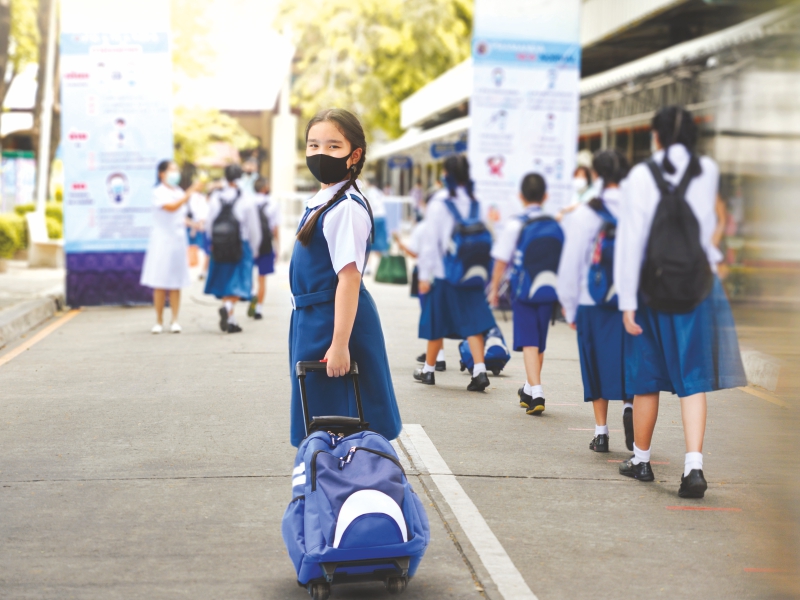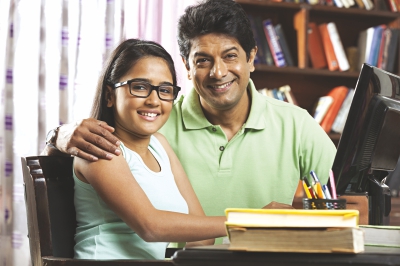Parents and teachers have the critically important task of easing and smoothing the return of anxious children to school amidst fears of outbreak of a second wave of the Covid-19 pandemic – Punita Malhotra

As schools cautiously reopen for middle and senior classes countrywide after almost a year of Covid-enforced shutdown, amid a battery of safety protocols such as staggered student entry and exit, compulsory thermal screening, hands sanitisation, and social distancing, children are experiencing mixed feelings about returning to the physical classroom after ten months of online classes or forced idleness. Sentiments of anxiety, fear, and nervousness are mixed with feelings of happiness and relief at finally being able to meet with friends and teachers. Parents and teachers have the critically important task of easing and smoothing the return of anxious children to school amidst fears of outbreak of a second wave of the Covid-19 pandemic.
Here’s a five-point agenda for parents and educators to ease the return of children to campus classrooms:
- Manage your own stress first. “Though schools have reopened their senior classes, there is still so much ambiguity and uncertainty about how schools will balance remote learning and in-school classes. I am also anxious about my children attending school during the pandemic with the virus still very much out there,” says Aditi Mathur Pathak, Gurugram-based mother of a teen.
Inevitably, parents are stressed but their stress is rubbing off on children. In a recent APA (American Psychological Association) Stress in America survey, 69 percent of parent respondents admitted that their stress impacted children. Further, 25-47 percent of adolescent children said that they were stressed by parental stress. Other research studies highlight that children cope more effectively with anxiety when parents role model good stress management behaviour. That’s why child psychologists urge parents to observe rules such as wishing children cheerful and confident goodbyes when they leave for school. It conveys that they (parents) believe that school is a safe place. Avoid leading questions such as “Are you feeling scared?” or “Will you be able to manage on your own” which are likely to exacerbate anxiety within children. - Protect with facts, not false promises. Parents and educators need to reinforce the importance of following safety protocols related to social distancing, hand washing, thermal screening, among other precautionary measures. Initiate age-appropriate, open discussion with children about the implications of returning to school. For instance, young children should be prepped to expect a smaller number of students in class, teachers wearing masks, reduced group activities and staggered lunch and play timings.
Children need to understand and feel reassured that their schools are following all necessary health and safety precautions and guidelines. It’s important to be honest with children and reiterate the importance of following and respecting the new standard operating procedures (SOPs). Moreover parents need to resist the temptation of making false promises such as “Don’t worry, no one is going to catch the virus in school.” - Adjust to new routines. Delhi-based counsellor, Shaila Rawal says that parents need to play a proactive role in enabling children to prepare for return to in-school classes. “After almost one year of online classes at home, children need time to readjust and refamiliarise themselves with reset old routines. Therefore parents should gently and patiently initiate children back into the school routine. In particular, it’s quite likely that the sleep routine of adolescents has been severely disrupted during the past year by online schooling. Parents should gently reschedule their sleep and waking timings in sync with school hours,” advises Rawal.
Moreover after schools reopen for pre-primary and primary children, parents will also have to confront the issue of separation anxiety, adds Rawal. “Youngest children have been learning from home for over a year now, and are likely to have forgotten critical socialisation skills such as learning to share with peers, interacting with teachers and adhering to a time table. Parents need to consciously inculcate these skills in children and ease their transition to normal schooling. Initially, returning to school will make preschoolers in particular irritable, cranky, aggressive and depressed with some exhibiting reluctance to going to school. But this stress is inevitable and normal. Parents must take the assistance of teachers and if required counsellors to help youngest children return to school,” she advises.  Offer positive encouragement. Most children will take time to come to terms with the once simple daily routine of attending school having become an unsafe and anxiety-filled experience. Parents need to provide positive encouragement by reminding children about the simple joys of spending time with friends, interacting face-to-face with teachers, hearing the toll of the school bell, wearing uniforms and packing school books. Parents should encourage children to share pleasant school-day experiences and motivate them to look forward to the next day, to keep their spirits high.
Offer positive encouragement. Most children will take time to come to terms with the once simple daily routine of attending school having become an unsafe and anxiety-filled experience. Parents need to provide positive encouragement by reminding children about the simple joys of spending time with friends, interacting face-to-face with teachers, hearing the toll of the school bell, wearing uniforms and packing school books. Parents should encourage children to share pleasant school-day experiences and motivate them to look forward to the next day, to keep their spirits high.
In the post-pandemic world, teachers too, will need to play a larger role beyond academics. “Teachers need to help children get used to new school routines by initiating positive dialogues as well as communicating regularly with parents. Reassuring students about the school’s SOPs will help them to regain confidence and learn to make decisions for their own safety,” says Neeta Dua, a Delhi-based educationist, with over three decades of teaching experience.- Be a sounding board and provide constructive support. Parents need to encourage children to freely discuss their anxieties and fears by initiating conversations and sharing their own daily ups-and-downs. Child psychologists advise parents to practice active listening with undivided attention and empathy during such conversations. New York-based Guy Winch, author of Emotional First Aid: Healing Rejection, Guilt, Failure, and Other Everyday Hurts (2012), says that during one-on-one conversations parents should express empathy by validating child emotions — fear, anger or nervousness — followed by inspiring and enabling them to address and eliminate negative thoughts and apprehensions.
Also read: Positive podcasts fever sweeping India























